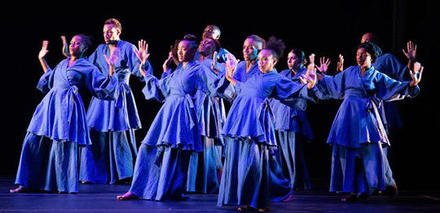Two black interactions of physicality and sound from choreographer Ronald K. Brown -- one new, one not new but still applicable.
Brown uses words and visuals to pry open constructs. Words: He calls his dance company Evidence, which is both the title of a rhythmically knotty Thelonious Monk composition and a tool that is finally being used to convict perpetrators of racially motivated murder; and, after hearing John Coltrane's "Equinox," he named his new work "The Equality of Night and Day," a metaphor for a cultural tipping point. Visuals: Brown selected his dancers not only for skill but for variety of body types, which he could present as equal and united; their African-influenced costumes placed them outside the European tradition even as their discipline made use of it.
The program began with "The Equality of Night and Day," with recorded music written especially for the piece by the brilliant pianist Jason Moran. The compositions displayed all Moran's melodic and emotional strengths, accented with exquisite dissonances appropriate to the theme. Beginning quietly and ending with beat-box rhythmic support, the music complemented the movement: The dancers conveyed generosity, love, fear and every other human state, in graceful gestures and flexible yet determined postures. The intelligent, ironic voice of Angela Davis intermittently floated above, reminding us of how long the light has been deferred.
The second half, "Upside Down," was created in 1998 but could have represented 1978. The recorded music by African singers Oumou Sangaré and Wunmi drove hard behind drums and warbling saxophones à la Fela Kuti, generating an atmosphere of sweaty, jubilant liberation. The dancers rushed and flowed like a dam burst, only to reveal the reason for their assembly as the lights dimmed, and first one, then another stiff figure was carried out on their newly somber shoulders. Now not only did everyone point in one direction, but a dark resolve had emerged.
* * *
Central among the bow takers at the end was Arcell Cabuag, artistic and life partner of Ronald K. Brown, the latter absent because he is recovering from a stroke. Read about Brown's struggle here.

